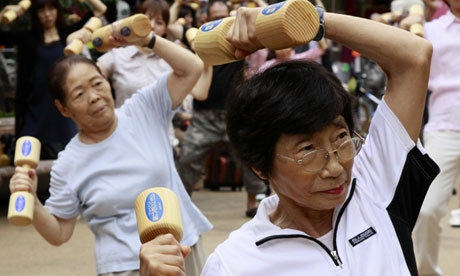Japan's centenarian population reaches over 50,000
Government figures reinforce country's reputation for longevity despite a fall in life expectancy after 2011's tsunami
Justin McCurry in Tokyo
guardian.co.uk, Friday 14 September 2012 18.02 BST

Women work out in the grounds of a Tokyo temple on national respect the aged day. Photograph: Yoshikazu Tsuno/AFP/Getty Images
That Saburo Shochi completed a round the world trip using only public transport was impressive enough; that he did so at the age of 106 was even more remarkable. Yet in his native Japan, there is no shortage of contemporaries with whom Shochi can celebrate his feat.
According to data released by the government on Friday, he is one of more than 50,000 Japanese people aged 100 or more. The survey by the health and welfare ministry shows the number of centenarians will rise to 51,376by Saturday, up 3,620 from last year.
The figures, released before the country's annual respect the aged day on Monday, reinforce Japan's reputation for longevity, although its women recently relinquished their place at the top of the global life expectancy table to their counterparts in Hong Kong. On Monday, those who reached their 100th birthday in the past year will receive a silver cup and a congratulatory letter from the prime minister.
The average lifespan of Japanese women fell by 0.4 years to 85.9 in 2011, putting it behind that of women in Hong Kong, who averaged 86.7 – a shift attributed in part to the large number of elderly victims of the 2011 tsunami in north-east Japan.
Women account for more than 87% of Japan's centenarians, although the country's oldest resident is a man, 115-year-old Jiroemon Kimura, who lives in Kyoto prefecture. The oldest woman is Koto Okubo, a 114-year-old resident of Kawasaki, just outside Tokyo. When the survey began in 1963, Japan was home to just 153 centenarians, and the number still stood at just 10,000 as recently as 1998.
Experts attribute the dramatic rise of the 100-plus generation to older people's fastidious attachment to the traditional low-fat Japanese diet, strong community ties, affordable healthcare and comparatively generous pensions.
The explosion in the population of Japanese over 65, coupled with a shrinking workforce, is expected to put unprecedented strain on the country's pension system in the decades to come.
Japan's oldest citizens were at the centre of a scandal in 2010 after it emerged that at least 200 centenarians had gone missing from local government records. In some cases, people who had died were still listed as alive, including a woman mistakenly recorded as having reached 125, whose registered home was turned into a park in 1981.
Sochi, whose trip around the globe has been recognised as a Guinness world record, travelled through North America, Europe and Africa as part of a series of lecture tours on child education and health he began several years ago. To achieve the record, he used scheduled, not chartered, public transport, including planes, trains, boats and buses.
On his arrival in Japan from his latest tour last month, the professor emeritus at Fukuoka University of Education said he intended to live even longer. "In my entire life, I've never said I am tired," he told reporters.
